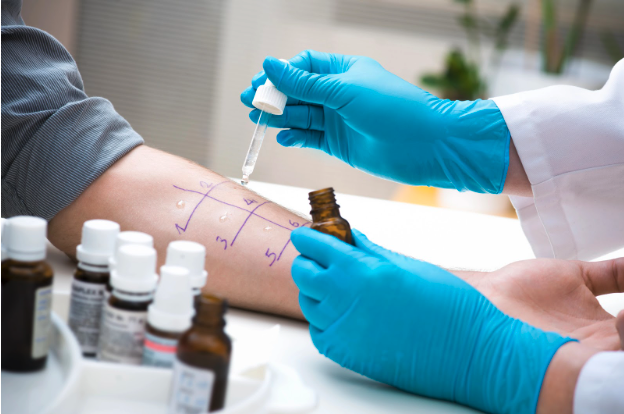Allergy Testing: Why It Matters and How It Can Benefit You
Apr 22, 2024
The Centers for Disease Control (CDC) announced in 2023 that one in four American adults live with seasonal allergies. Just over six percent of the population have food allergies, while a little over seven percent have eczema. Four and a half million children have asthma, and the condition also affects 20 million adults.
Because allergies are so common, people often take over-the-counter medications to treat them without consulting a doctor. However, seeing an allergy specialist to receive professional allergy testing is critical to understanding and treating the source of the allergies. Dr. Lutz at Unity Health Network offers allergy skin testing for people who suspect they may have allergies or other respiratory problems.

Table of Contents
- What is Allergy Testing?
- Blood Testing
- Skin Testing
- Common Reasons for Allergy Testing
- Identification of Specific Triggers
- Understanding the Severity of Allergies
- Developing an Appropriate Treatment Plan
- The Process for Allergy Testing
- Preparing for Allergy Testing
- Interpreting Allergy Test Results
- Next Steps After Allergy Testing
- Allergy Testing is a Critical Component of Symptom Management
What is Allergy Testing?
Allergy testing is a medical procedure that measures your sensitivity to various substances that trigger allergies. The test does not tell you or your doctor whether you have an allergy, but only if your body reacts to a trigger unusually. The doctor uses information from the allergy skin testing and self-reported symptoms to create a customized treatment plan for you.
Below are the most common ways an allergy specialist tests for allergic reactions.
Blood Testing
Blood testing involves a single, small prick with a needle and a wait for the results. The advantage of blood testing is that it can determine several types of allergies with a single blood draw. The downside is that the test is more likely to produce false positive or false negative results than any other type of allergy testing.
Skin Testing
Also known as skin prick testing, this test involves a nurse either scratching or injecting a tiny amount of common allergens like pet dander and pollen into your skin. The nurse then observes if you develop a welt or hive on your skin from the allergy trigger and reports the results. Skin testing takes up to 45 minutes; you can expect several skin pricks to complete the test.
Common Reasons for Allergy Testing
Most people undergo allergy testing to distinguish symptoms similar to allergies from common illnesses, such as the common cold or asthma. When referred to an allergy specialist, patients usually present with symptoms such as sneezing, itchy skin, watery eyes, runny nose, and a scratchy throat. They must identify and properly diagnose their allergies to ensure they take the correct medication and implement the necessary lifestyle changes to help them feel better.
Identification of Specific Triggers
The most valuable part of the allergy testing process is determining which triggers are causing your body to overreact and cause you to suffer allergy symptoms. Allergies can fall into one of these six categories:
- Airborne: Particles commonly found in outdoor or indoor air include animal dander, dust mites, mold, and pollen
- Food: The top allergies in the food category include eggs, fish, milk, nuts, peanuts, shellfish, soy, and wheat
- Insects: You may be allergic to bees and/or wasp stings without realizing it
- Latex: Certain latex products can cause skin irritation in people sensitive to latex or lead to more severe symptoms. The most common offenders are balloons, paint, and rubber bands.
- Medications: Allergies to medications such as penicillin can cause severe or even life-threatening symptoms
- Skin: Some people may experience a reaction to skincare products and laundry detergents
Understanding the Severity of Allergies
How your body responds to various allergy tests helps your doctor understand the severity of your allergies. The same is true of reviewing your medical history and self-reported symptoms. Combining these data points allows her to customize a treatment plan for your specific allergy. Dr. Lutz can also diagnose asthma or other respiratory disorders that require more intensive treatment from an ENT specialist.
Developing an Appropriate Treatment Plan
If you have food allergies, treating them can be as simple as eliminating that specific food trigger from your diet. You can also change your environment at home or work to reduce your exposure to known allergy triggers. Common examples include training your pet to stay in one area of the house, removing toxic mold, or keeping windows closed on days with high pollen counts.
Your physician may also recommend taking prescription medication or allergy shots or allergy drops to control your symptoms. Also known as immunotherapy, allergy shots involve a weekly injection to desensitize your body to the substances that cause allergic reactions. Allergy drops work in a similar fashion but are safe to administer at home.
The Process of Allergy Testing
Allergy skin testing is the most common way of diagnosing specific allergy triggers. After you receive several injections, you sit for up to 45 minutes as your body processes the substance. You may experience symptoms such as itching, sneezing, and other typical allergy symptoms. .
The blood test is also a short appointment, as you only receive one injection. The injection site may be sore for several hours after the injection. If so, ask your doctor how best to relieve the discomfort.
Preparing for Allergy Testing
Following pre-test instructions will help you prepare for the test and ensure you get the most accurate results from your allergy testing. You should discontinue the use of antihistamines three or four days before your scheduled test, as they can interfere with the results.
You may also need to stop taking other chronic medications, so check with your allergy specialist. Other steps include:
- Avoid wearing any scented products on the day of your test
- Do not smoke or consume any beverages with caffeine before your test
- Fast after midnight, if you are having a blood test
- Shower the morning of your test
Interpreting Allergy Test Results
Positive test results indicate that your body is sensitive to specific allergy triggers, while negative results mean no sensitivity exists for that allergy trigger.
A mild response, such as sneezing and a runny nose, usually means that you can treat your allergies with lifestyle changes and/or medication. However, a more severe response, like difficulty breathing, indicates that you need more significant medical intervention to manage your allergy or asthma triggers.
Once you know your allergy triggers and the severity of your symptoms, the next step is to consult an allergist to discuss and understand the results. After completion of the allergy testing a follow up appointment will be scheduled with Dr. Lutz to discuss the results.
Next Steps After Allergy Testing
Reducing or eliminating your allergy symptoms requires following the treatment plan your allergist prepared. Make sure you fully understand the plan. Most people can relieve allergy symptoms with prescription medication, environmental changes, or immunotherapy.
Remember that what works to relieve your allergy symptoms now may become less effective in the future. So, you must keep your follow-up appointments at your ENT clinic. Your doctor will monitor your progress at each check-in and revise your treatment plan if necessary.
Allergy Testing is a Critical Component of Symptom Management
You may suspect you have allergies and take steps to manage them, but that is not always enough. Knowing your specific allergies and the severity of each allergy allows you to treat your symptoms much more effectively. The testing process is fast, produces only mild discomfort, and offers relief you cannot obtain alone. Contact Unity Health Network to learn more about allergy testing or to schedule an appointment.




